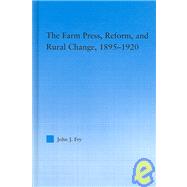- ISBN: 9780415972864 | 0415972868
- Cover: Hardcover
- Copyright: 4/27/2005
In the late nineteenth and early twentieth centuries, economic, demographic and cultural changes transformed American life. Immigration, urbanization, and industrial growth changed the United States form a rural to an urban nation. As Richard Hofstadter noted, "the United States was born in the country and moved to the city." This dissertation examines Midwestern farmers and farm newspapers during the Progressive Era. By the late nineteenth century, reading had become a necessity of life for farmers as it had for the rest of the country. Far from being "hicks" who were out of the mainstream of American culture, rural Midwesterners were careful readers of many of the same publications as city people. They also read for many of the same reasons: to entertain themselves and their families, to build and maintain communities of like-minded people and to obtain useful information for their lives. Farm newspapers reached out to as many of these rural readers as possible. They reached all types offarmers-including landowners and renters-at all socioeconomic levels. Farmers did not publish newspapers, however. Owners and editors had left the countryside to pursue careers in journalism. As a result, urban progressive reformers often influenced editors and other writers. Farm newspapers communicated recommendations from reform to rural Midwesterners, including advice about the rural church, the country school, and the farm family. Rural Midwesterners did not accept their advice unquestioningly however. Farmer were complex people, adopting some reforms and discarding others. This project contributes to our understanding of rural Midwesterners and farm newspapers at the turn of the century. While cultural historians have mainly focused on readers in town and cities, it examines Midwestern farmers. It also contributes to the "new rural history" by exploring the ideas of Hal Barron and others that country people selectively adapted the advice given to them by reformers. Finally, it furthersour understanding of American farm newspapers themselves and offers suggestions on how to use them as sources.






